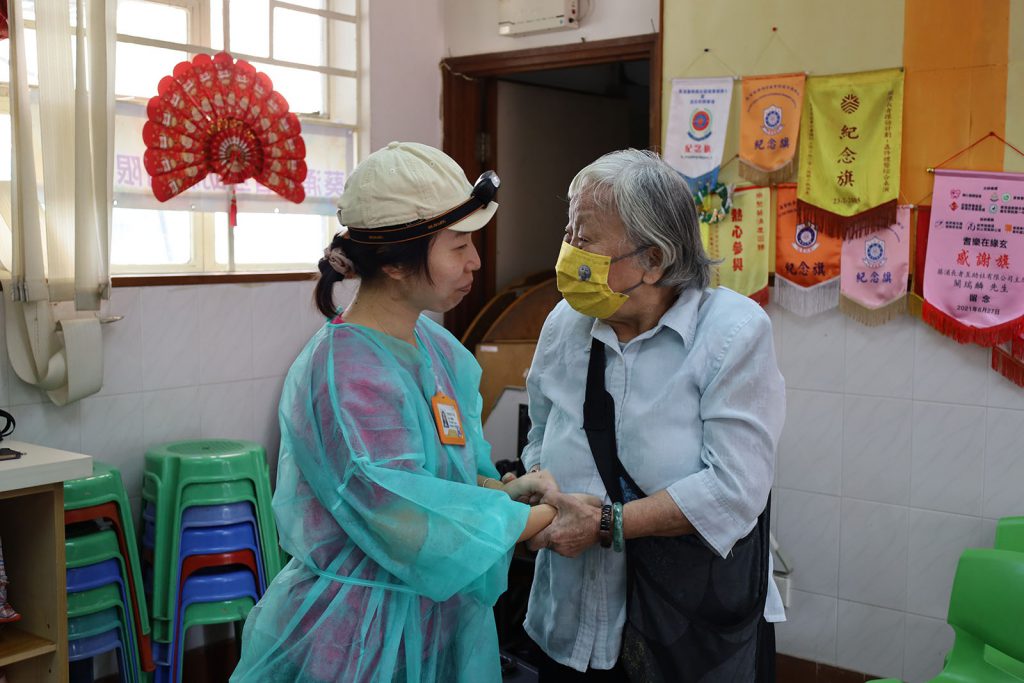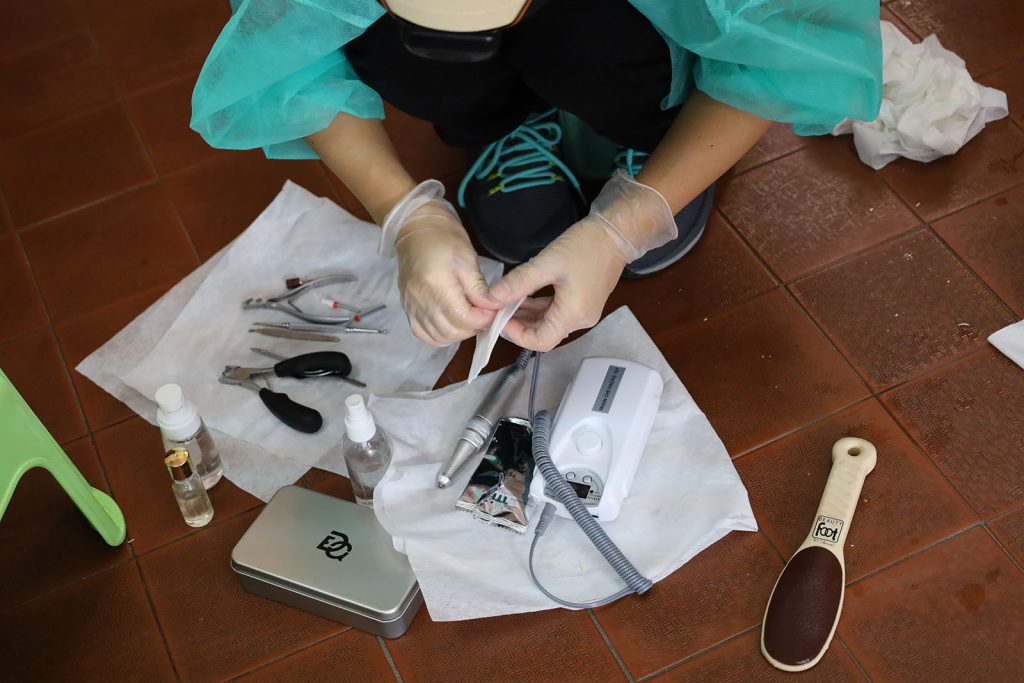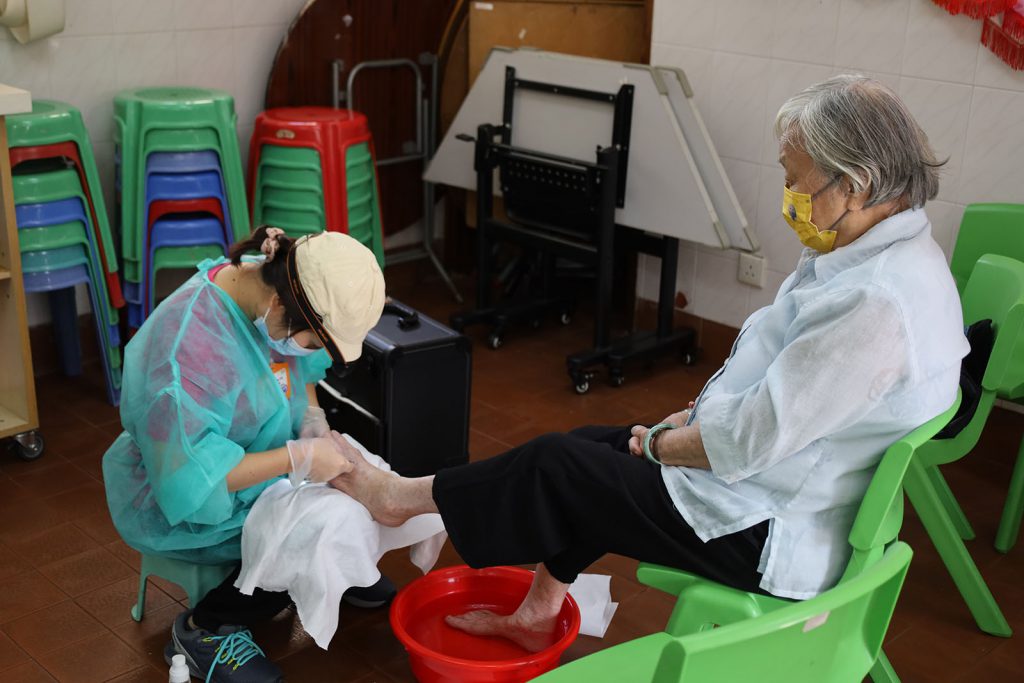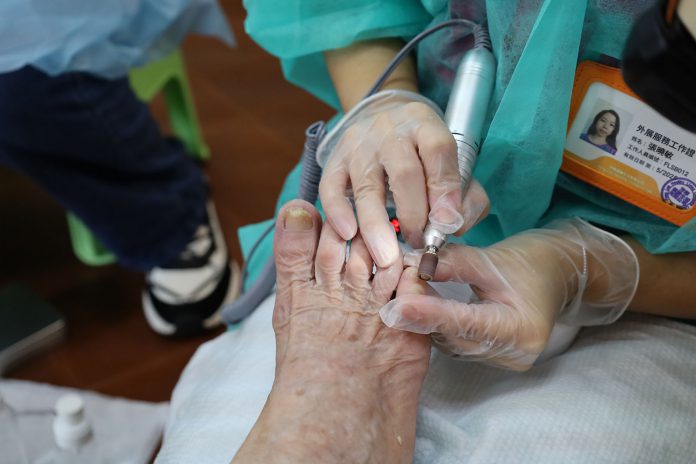Volunteers provide free manicure service for the elderly, making them feel touched.
By Nicole Li
Tang Woon-kuen gives heartfelt hugs to volunteers with teary eyes after receiving their manicure service.
“I have never experienced such happiness in my entire life. Thank you very much to all the volunteers. Thank you,” the granny says.

For the 91-year-old lady who lives alone, a simple thing in life like clipping her toenails is a big challenge.
Suffering from thick toenails for more than ten years, Tang has never consulted a doctor. She just accepts that it is a part of her life.
“I never thought of tackling this problem. It is too luxurious to see a doctor just for nails,” the silver-haired lady says.
Tang finds it difficult to clip toenails by herself. “My back can’t bend over to touch my toes,” she says.
She has never fixed her nail problem until Min Zhang Xiao-min, a volunteer who helps her clip and tend her toenails with a set of manicure kits.

She gently lifts Yang’s foot and places it on her lap. “Be careful. No hurry. Are you taking any medication now?” Min asks each time before starting to fix Tang’s nails.
Min takes extra care in cleaning and removing dirt from underneath Tang’s toenails, as they are the source of an unpleasant odour.
“If the nails are stuck with dirt, it is easy to get infected and make the elderly feel uncomfortable,” the volunteer says.
Min understands the plight of the elderly and enjoys doing voluntary manicure work. “I will be old someday. I just want to do whatever I can to help them because I understand that it is hard for the elderly to handle nail problems,” she says.
“Doing volunteer work is rewarding. It gives me a sense of accomplishment,” she adds.

Min learns manicure and self-healing nail techniques from Fannie Yung Ching-han, a manicure instructor at the Employees Retraining Board. She invites Min to be a volunteer for the service.
“Tang’s case isn’t the worst. There are other cases that are far more serious. That’s also why very few people join this industry, as they have to deal with smelly and dirty toenails all day long,” Yung says.
“I hope that my students can apply what they have learnt to help those in need. This also helps them further improve their skills,” she adds.
Engaged in the beauty and manicure industry for over 40 years, Yung is cautious when handling manicure services, especially when the clients are the elderly.
“We usually ask them a day in advance to provide a picture of their nails that need a manicure to get a better idea of the severity of the problem,” Yung says.
The number of elderly people in Hong Kong will rise from 1.45 million in 2021 to 2.74 million in 2046, according to the Census and Statistics Department.
SilverHub, a social enterprise that offers manicure services to the elderly, was set up in August 2022 with 15 volunteers.
Kennis Chun Yin-ping, one of the founders of the organization, hopes the service can provide more support for elderly people.
“There is a growing demand for elderly nail care services due to the rapid increase in the ageing population. The elderly, especially those who live alone, may struggle to take care of themselves,” Chun says.
“They tend to overlook the health of their fingernails or toenails. They may think it is just a bone problem, but in fact, it can be ingrown nails causing bleeding,” she adds.
The group offers two types of services: free and paid. Free services are available to those referred by social workers in community centres or elderly homes.
For the charged service, the group charges HK $250 (US $32) for either hands or feet and HK $380 (US $48) for both hands and feet.
“We have noticed that many elderly people have such needs, but not everyone can afford to pay for a service. Many nail salons charge high prices. I have seen places charging HK$1,000 (US$128),” Chun says.
“Most people learn manicure primarily for beauty purposes and do not want to treat nail problems like fungal infection, as they find it repulsive,” she explains.
Dr. Florence Fong Meng-soi, the Deputy Director of the Asia-Pacific Institute of Ageing Studies, believes that the government has many concerns in policymaking.
“The government hopes to follow the principle of home-based elderly care, providing a range of services focused on the local community and their home through the Social Welfare Department,” Fong says.
Apart from the general daily services related to clothing, food, housing and transportation, there is another category known as specialized emergency services.
“The government needs to assess the imminence of the issue – Can the market fill the gap and provide services?” she points out.
Fong thinks that it is hard to define the responsibility for providing specialized services for the elderly.
“The demand can be infinite. But who is responsible for taking care of the seniors? Is it the responsibility of the family caregivers? the market? The elderly themselves? Or the government? This can be an ethical question,” she says.
Sub-edited by Kossy Chen







































